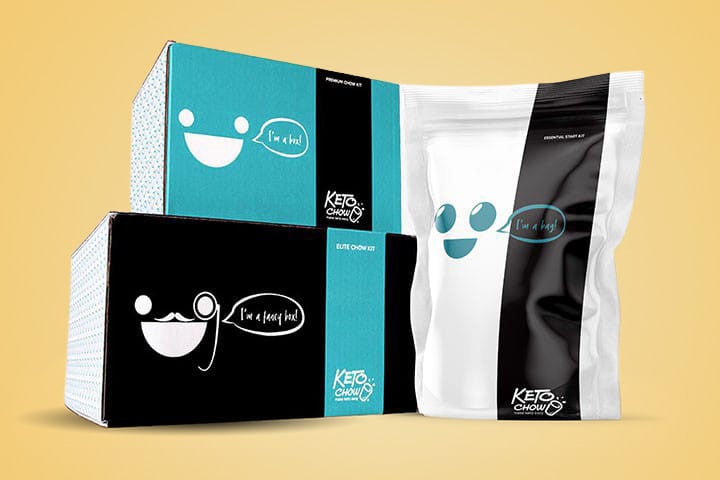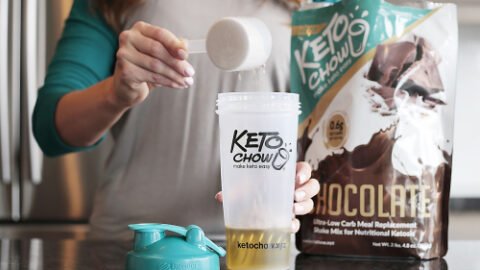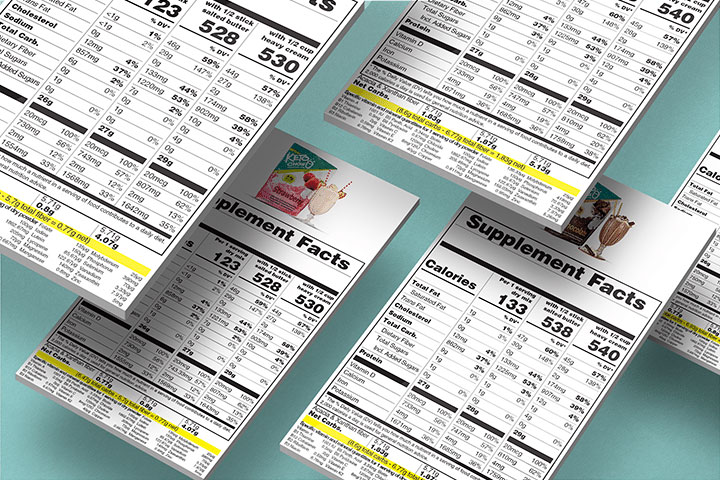One of the biggest misconceptions standing in the way of ketogenic diets being more widely recommended by medical professionals is confusion between nutritional ketosis and diabetic ketoacidosis.
Let’s take a moment to discuss the differences between these, dispel common myths, and allay fears so that people can feel encouraged to try this powerful strategy for weight loss and improving health.
What is ketosis?

Let’s start with the obvious: the word ketogenic is used to describe very low-carb diets because when you eat this way, your body generates ketones.
When carbohydrates are restricted below a certain amount (50 grams per day for most people, although it can be closer to 20-30 grams per day for some people), your body switches from being fueled primarily by carbs (glucose) to being fueled primarily by fat. Ketones are generated as a byproduct of breaking down and burning fat.
The presence of ketones is nothing to fear. They are a normal part of human physiology.
Biochemistry textbooks are clear on this point: “Ketone bodies are a normal fuel for a variety of tissues and are part of a complex pattern of fuel metabolism. […] Many tissues prefer to use fatty acids and ketone bodies as oxidizable fuels in place of glucose. […] Acetoacetate and β-hydroxybutyrate produced by the liver are excellent fuels for many nonhepatic tissues [outside the liver], including cardiac muscle, skeletal muscle, and brain, particularly when glucose is in short supply.”1
Dr. Stephen Phinney and Dr. Jeff Volek, two leading keto researchers, wrote in their book, The Art and Science of Low Carbohydrate Living, “Nutritional ketosis is by definition a benign metabolic state that gives human metabolism the flexibility to deal with famine or major shifts in available dietary fuels.”2
Dr. Robert Atkins, creator of the famous Atkins Diet, also used the word “benign” with regard to nutritional ketosis. But considering the numerous health conditions that may improve with adherence to a keto diet, it can be argued that ketosis isn’t just benign, it’s downright beneficial. 3
Ketones sound great… so why are people afraid?

The reason medical professionals may be concerned about people deliberately trying to achieve a state of ketosis is that ketone molecules are acidic. Your body aims to keep your blood very slightly alkaline, so if the concentration of ketones in your blood becomes too high, the fear is that your blood will become overly acidic, which is indeed a potentially life-threatening situation.
But it’s important to know that this almost never happens solely as a result of carbohydrate restriction in the context of a keto diet.
Except for using ketogenic diets as a treatment for epilepsy, the only exposure to ketosis that many healthcare professionals had during education and training was this harmful, out-of-control ketoacidosis—when the blood ketone level is extremely high, the blood is dangerously acidic, and typically blood glucose is also very high. Only recently are they becoming more educated about the numerous benefits of safe, benign, nutritional ketosis.
Nutritional ketosis versus ketoacidosis
There are three major differences between ketoacidosis and nutritional ketosis.
1. In nutritional ketosis, your ketone level stays within a safe range.

In the metabolic state induced by a keto diet, blood ketone levels generally stay below 4.0 or 5.0 mmol/L. In fact, most people rarely see levels that high unless they’re doing an extended or multi-day fast, in which case blood ketones can be as high as 6.0 or 7.0 mM.4,5
On a keto diet when someone is not fasting, ketone levels vary, but a typical range is 0.5 to 5.0 mM, although there is no formally agreed upon definition.2 (If your level is slightly lower—closer to 0.2 or 0.3 mM, you’re still in ketosis, just at a low level.) Contrast this with ketoacidosis, in which blood ketones may be as high as 15-25mM. This is five to ten times higher than the range commonly seen in nutritional ketosis.2
Don’t confuse nutritional ketosis and ketoacidosis just because they both have “keto” in their name. The difference in ketone concentration in nutritional ketosis and ketoacidosis is like the difference between a gentle spring breeze and a hurricane. Both involve wind, but they’re worlds apart in magnitude of impact. You don’t want a hurricane blowing your house down, but a gentle spring breeze across the front porch is very nice.
The reason blood ketones don’t continue rising ever higher on a keto diet is that they keep their own production in check. As your ketone level starts to rise, a very small amount of insulin is released. Not as much as if you were eating something sugary or starchy—just a tiny amount, which is enough to keep your ketones from reaching a dangerous level.
The rising ketone level itself is what tells your body to slow down on producing more ketones. So unless you have difficult-to-control type 1 diabetes or are in another situation where you may not have adequate insulin, there is little danger of your blood having a pathological concentration of ketones on a keto diet.
2. In nutritional ketosis, blood does not become acidic.

At the ketone levels typically attained on a keto diet, your body has no problem engaging its built-in buffering system, so your blood pH remains within a perfectly normal, safe range. It’s only when the ketone level becomes excessive that it overwhelms this buffering capacity and your blood would become acidic. I’ll leave it to Drs. Phinney and Volek to explain again:
“There is a persistent myth that nutritional ketosis results in clinically significant acidosis, despite overwhelming evidence to the contrary. Yes, the modest rise in serum ketones will shift serum chemistries a bit toward the acid end, but blood pH and serum bicarbonate values almost always remain well within the normal range. […]
“Put another way, the buffering capacity of otherwise healthy humans is able to compensate across the full range of nutritional ketosis without any significant metabolic disturbance.”6
“One of the many myths about ketogenic diets is that they cause the body to go into a state of acidosis. This stems from the unfortunate fact that many doctors and lay people alike confuse nutritional ketosis (blood ketones at 1-3 millimolar) with ketoacidosis (blood ketones greater than 20 millimolar).
“In nutritional ketosis, blood pH at rest stays normal … By contrast, in keto-acidosis, blood pH is driven abnormally low by the 10-fold greater buildup of ketones. Suggesting these two states or similar is like equating a gentle rain with a flood because they both involve water.”7
3. In nutritional ketosis, blood glucose is normal.

In cases of diabetic ketoacidosis, it isn’t just ketones that are sky-high, but also typically blood glucose, too—in the range of 250–600 mg/dL (13.9–33.3 mM).8 In fact, some researchers posit that ketoacidosis is defined “by metabolic acidosis, high blood glucose, and the presence of ketone bodies in blood and urine.”8
In the nutritional ketosis that results from a keto diet, at least two of these don’t apply: acidosis and high blood glucose. Ketones will be present in the blood and urine, but at levels far lower than what is seen in ketoacidosis.
Important Exception

There have been reports of ketoacidosis even when someone’s blood glucose is normal, and even among people who don’t have diabetes. This is called euglycemic ketoacidosis.9
However, it is important to note that this doesn’t happen spontaneously, and that keto diets by themselves don’t lead to this. There are some rare medical conditions that can result in euglycemic ketoacidosis, but one of the more common causes is use of medications called sodium glucose co-transporter-2 inhibitors. (SGLT-2i, used for both type 2 and type 1 diabetes.)10-15
It’s not known for certain what the mechanism is by which these drugs induce ketoacidosis, but it may be that they cause the kidneys to reabsorb ketone bodies, and they also increase glucagon secretion while decreasing insulin secretion, which would stimulate breaking down fat and raising ketones.14,15
There have been numerous reports of this in people using these drugs whose blood glucose was <200 mg/dL (11.1 mM). Most of the rare instances of ketoacidosis among people following low-carb or keto diets have occurred in people using these drugs for diabetes; acidosis was not brought on by the diet itself.16,17
As always, work with your doctor if you have concerns about any medications you may be taking. Never adjust or stop medications on your own.
Summing up

Is a keto diet likely to induce ketoacidosis in the absence of complicating factors? No. Your body has a complex network of checks and balances to keep your ketone level—and therefore, your blood acidity—within a safe range. So you know what to do: “Keep calm and keto on!”
Resources
- Devlin, T., ed. (2011). Textbook of Biochemistry with Clinical Correlations (7th edition). Hoboken, NJ: John Wiley & Sons, Inc. p.699-700.
- Volek, JS. & Phinney SD. (2011). The Art and Science of Low Carbohydrate Living. Beyond Obesity, LLC. p.5.
- Staverosky T. Ketogenic Weight Loss: The Lowering of Insulin Levels Is the Sleeping Giant in Patient Care. J Med Pract Manage. 2016 Sep;32(1):63-66.
- Cahill GF Jr, Veech RL. Ketoacids? Good medicine? Trans Am Clin Climatol Assoc. 2003;114:149-163.
- Hashim SA, VanItallie TB. Ketone body therapy: from the ketogenic diet to the oral administration of ketone ester. J Lipid Res. 2014;55(9):1818-1826.
- Volek, JS. & Phinney SD. (2011). The Art and Science of Low Carbohydrate Living. Beyond Obesity, LLC. p.167.
- Volek, JS. & Phinney SD. (2012). The Art and Science of Low Carbohydrate Performance. Beyond Obesity, LLC. p.35.
- Hörber S, Hudak S, Kächele M, et al. Unusual high blood glucose in ketoacidosis as first presentation of type 1 diabetes mellitus. Endocrinol Diabetes Metab Case Rep. 2018;2018:18-0094.
- Bonora BM, Avogaro A, Fadini GP. Euglycemic Ketoacidosis. Curr Diab Rep. 2020 May 19;20(7):25.
- Ullah S, Khan N, Zeb H, Tahir H. Metabolic ketoacidosis with normal blood glucose: A rare complication of sodium-glucose cotransporter 2 inhibitors. SAGE Open Med Case Rep. 2016;4:2050313X16675259.
- Wolfsdorf JI, Ratner RE. SGLT Inhibitors for Type 1 Diabetes: Proceed With Extreme Caution. Diabetes Care. 2019 Jun;42(6):991-993.
- Palmer BF, Clegg DJ. Euglycemic Ketoacidosis as a Complication of SGLT2 Inhibitor Therapy. Clin J Am Soc Nephrol. 2021 Feb 9:CJN.17621120.
- Evans M, Hicks D, Patel D, Patel V, McEwan P, Dashora U. Optimising the Benefits of SGLT2 Inhibitors for Type 1 Diabetes. Diabetes Ther. 2020;11(1):37-52.
- Diaz-Ramos A, Eilbert W, Marquez D. Euglycemic diabetic ketoacidosis associated with sodium-glucose cotransporter-2 inhibitor use: a case report and review of the literature. Int J Emerg Med. 2019;12(1):27.
- Somagutta MR, Agadi K, Hange N, et al. Euglycemic Diabetic Ketoacidosis and Sodium-Glucose Cotransporter-2 Inhibitors: A Focused Review of Pathophysiology, Risk Factors, and Triggers. Cureus. 2021;13(3):e13665.
- Hayami T, Kato Y, Kamiya H, et al. Case of ketoacidosis by a sodium-glucose cotransporter 2 inhibitor in a diabetic patient with a low-carbohydrate diet. J Diabetes Investig. 2015;6(5):587-590.
- Fukuyama Y, Numata K, Yoshino K, Santanda T, Funakoshi H. Euglycemic diabetic ketoacidosis due to a strict low-carbohydrate diet during treatment with sodium-glucose cotransporter 2 inhibitors. Acute Med Surg. 2020;7(1):e480.

























